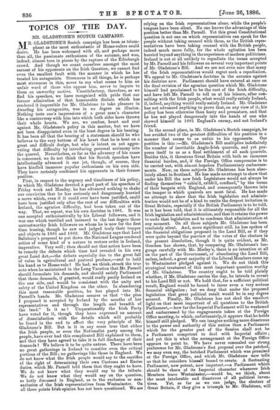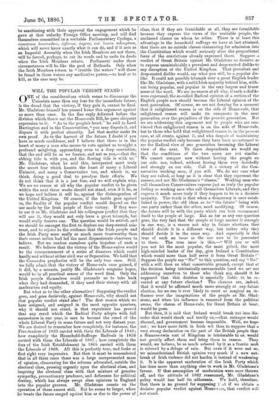TOPICS OF THE DAY.
MR. GLADSTONE'S SCOTCH CAMPAIGN.
IVIR. GLADSTONE'S Scotch campaign has been as trium- phant as the most enthusiastic of Home-rulers could desire. He has been welcomed with all, and perhaps more
than all, the passionate enthusiasm of the autumn, and was, indeed, almost torn in pieces by the rapture of the Edinburgh crowd. And though we count ourselves amongst the most earnest of his opponents on the Irish Question, we cannot find even the smallest fault with the manner in which he has treated his antagonists. Strenuous in all things, he is perhaps most strenuous in this, never to say what seems to him an unfair word of those who oppose him, never to impute to them an unworthy motive. Unsatisfactory, therefore, as we find his speeches, we have recognised with pride that our former admiration of that honourable disdain which has rendered it impossible for Mr. Gladstone to take pleasure in dwarfing his antagonists, was in no degree an illusion. Nothing tests one's impressions of a great man's character like a controversy with him into which both sides have thrown their whole hearts. We are, we confess, heart and soul against Mr. Gladstone's policy in this matter, but we have not been disappointed even in the least degree in his bearing. It has been all that the bearing of a statesman should be who believes to the very bottom of his heart that he is bent on a great and difficult design, but who is intent on not aggra- vating that difficulty by introducing personal acrimony into the quarrel. Nevertheless, so far as the advocacy of his cause is concerned, we do not think that his Scotch speeches have intellectually advanced it one jot, though, of course, they have kindled immense popular enthusiasm on his own side. They have certainly confirmed his opponents in their former position.
First, in respect to the urgency and timeliness of his policy, to which Mr. Gladstone devoted a good part of his speeches of Friday week and Monday, he has advanced nothing to shake our conviction that he has seriously and dangerously hurried a move which, even if it could ever have been justified, could have been justified only after the root of our difficulties with Ireland, the agrarian difficulty, had been taken out of the way. That, we repeat, was his own doctrine in 1881. It was one accepted enthusiastically by his Liberal followers, and it was one which terrified and incensed to the last degree those untrustworthy Irish followers on whom he is now for the first time leaning, though he saw and judged truly their temper and objects in 1881 and 1882. Mr. Gladstone says that Lord Salisbury's proposal to put down the National League rendered action of some kind of a nature to restore order in Ireland, imperative. Very well ; then should not that action have been to remedy the defects which time had revealed in his own great Land Act,—the defects especially due to the great fall of value in agricultural and pastoral produce,—and to hold his hand as to Home-rule ? He had, we think, struck the true note when he maintained in the Long Vacation that Mr. Parnell should formulate his demands' and should satisfy Parliament that those demands, if granted, would really pacify Ireland on the one side, and would be consistent with the unity and safety of the United Kingdom on the other. In abandoning this most reasonable position, he has played into Mr. Parnell's hands. Mr. Gladstone assures us that "the plan I proposed is accepted by Ireland by the mouths of her representatives and through the length and breadth of the land." Is it so ? Unquestionably the Irish Party have voted for it, though they have expressed an amount of dissatisfaction with the details which will probably be found in the end to affect the very principle of Mr. Gladstone's Bill. But is it in any sense true that either the Irish people, or even the Nationalist party among the people, have ever had this complicated Bill explained to them, and that they have agreed to take it in full discharge of their demands ? We believe it to be quite untrue. There have been no great gatherings in Ireland to consider even the critical portions of the Bill ; no gatherings like those in England. We do not know what the Irish people would say to the sacrifice of the right of determining their own Customs and Excise duties, which Mr. Parnell told them that they ought to have. We do not know what they would say to the tribute. We do not know what they would say on the question, so hotly discussed in England, as to the exclusion or non- exclusion of the Irish representatives from Westminster. On all these points Irish opinion bee not been questioned. We are
relying on the Irish representatives alone, while the people's tongues have been silent. No one knows the advantage of this position better than Mr. Parnell. Yet this great Constitutional question is not one on which representatives can speak for the people without taking counsel with them, as the British repre- sentatives have been taking counsel with the British people, indeed much more fully, for the whole agitation has been hurried beyond anything in the experience of modern politicians. Ireland is not at all unlikely to repudiate the terms accepted by Mr. Parnell and his followers on several very important points of Mr. Gladstone's Bill. And we are not even sure that many of the Irish representatives would regret such a repudiation. We appeal to Mr. Gladstone's doctrine in the autumn against his doctrine now. Parliament should have entered at once on the final revision of the agrarian question which Mr. Gladstone himself had proclaimed to be the root of the Irish difficulty, and have left Mr. Parnell to tell us at his leisure, after con- sulting with the Irish people, what would really satisfy Ireland, if, indeed, anything would really satisfy Ireland. Mr. Gladstone has not advanced anything to prove that, on any view of it, his policy has been otherwise than hasty and premature, and that he has not played dangerously into the hands of one who showed himself in 1881 England's enemy, and not Ireland's friend.
In the second place, in Mr. Gladstone's Scotch campaign, he has avoided two of the greatest difficulties of his position in a manner that seems to us unfair to his opponents. Our position is this :—Mr. Gladstone's Bill multiplies indefinitely the number of inevitable Anglo-Irish quarrels, and yet pro- poses itself to us as a final settlement of all such quarrels. Besides this, it threatens Great Britain with both an immense financial burden, and, if the Foreign Office compromise is to be carried out, with almost hopeless Parliamentary embarrass- ments. Now, on these subjects Mr. Gladstone has been abso- lutely silent in Scotland. He has made no attempt to show that under his Bill the new Irish Legislature would not always be finding themselves " cabin'd, cribb'd, confined," by the terms of their bargain with England, and consequently thrown into the temper in which quarrels are most fatal. He has made no attempt to show that the Irish legislation and adminis- tration would not be of a kind to excite the deepest irritation in Great Britain, especially if the British Parliament is to be told, as it has been told, that it is ultimately responsible for all the Irish legislation and administration, and that it retains the power to undo that legislation and to condemn that administration at any moment. On all these subjects Mr. Gladstone has been resolutely silent. And, more significant still, he has spoken of the financial obligations proposed in the Land Bill, as if they were quite beyond the purview of the votes of the electors in the present dissolution, though it is quite evident, as Mr. Goschen has shown, that, by comparing Mr. Gladstone's lan- guage carefully with Mr. Morley's, there is no intention at all on the part of the Government, of abandoning the Land Bill, unless, indeed, a great majority of the Liberal Members come up to Westminster pledged against it. We do not think this strategical treatment of this most important question worthy of Mr. Gladstone. The country ought to be told plainly whether, if Mr. Gladstone carries the day, he intends to revert to his Land Bill or not. We hold that, for a sufficient political result, England would be bound to incur even a very serious financial obligation ; but we deny that under the proposed legislation that great political result would be in any degree secured. Finally, Mr. Gladstone has not shed the smallest light on that most important of all questions to the British Parliament,—how far the Imperial Parliament will be weakened and embarrassed by the engagements taken at the Foreign Office meeting, to which, unfortunately, it appears that he holds himself still pledged. We can imagine nothing more disastrous to the power and authority of this nation than a Parliament which for the greater part of the Session shall not be a Parliament competent to deal with Imperial affairs ; and yet this is what the arrangement at the Foreign Office appears to point to. We have never concealed our strong preference for Mr. Gladstone's first proposal over the patched, we may even say, the botched Parliament which was promised at the Foreign Office, and which Mr. Gladstone now tells us that he considers himself bound to create. A fluctuating Parliament, now potent, now impotent,—a Parliament which should be shorn of its Imperial character whenever Irish Members leave Westminster,—would be, we think, .about the most intolerable and disastrous of all political inven- tions. Yet, so far as we can judge, the electors of Great Britain, if they give a triumph to Mr. Gladstone, will
be sanctioning with their approval the engagement which he gave at that unlucky Foreign Office meeting, and will find themselves committed to a veritable Parliamentary Cyclops, a monstrum horrendunt, infornie, ingens, cui lumen ademptum, which will never know exactly what it can do, and if it acts as an Imperial Assembly when the Irish Members are not there, will be forced, perhaps, to eat its words and to undo its deeds when the Irish Members return. Parliament under these circumstances will be like the pool of Bethesda. Only when the Irish Members return to "trouble the waters" will there be found in those waters any medicative power,—to heal or to kill, as the case may be.



































 Previous page
Previous page